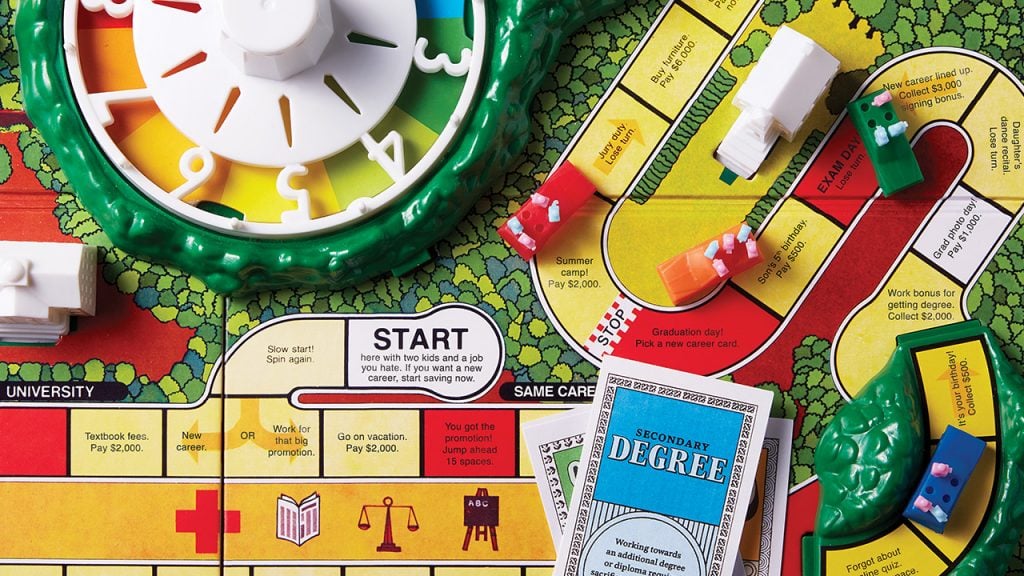Adults Continuing Education as Their Kids Go Back to School
Moms and dads make excellent pupils, but face more challenges when they return to school after having kids. Here's what to expect if you're thinking about heading back to class.
When her daughter started kindergarten, Ann Toohey enrolled at the University of Calgary as an undergraduate student. She was 40. The mom of one already had a liberal arts degree in chemistry, but after two decades of doing various jobs—in cancer research, bike-path development, fundraising and communications—Toohey realized she wanted to work in public health, improving the lives of older adults. She also liked the idea of a career track with better pay. Obtaining a bachelor of health sciences degree seemed like a step in the right direction.
After enduring an awkward year as an undergraduate student—where she was sometimes mistaken for the prof—Toohey switched to a master's program in community health sciences and went on to earn her Ph.D., while her daughter concurrently completed elementary school and junior high.
The decade Toohey spent juggling school and parenthood was worth it. She landed a job at the University of Calgary, where she manages projects at an aging centre, researching issues unique to older adults and working on initiatives that aim to improve their lives. She also earns a better salary.
Toohey is far from alone in her quest for higher education after becoming a parent. "Student parents"—defined as a subset of mature students who are 25 and older and have dependants under the age of 18 living at home—make up between 11 and 16 percent of Canadian post-secondary enrollments in degree, diploma or certificate programs. Add in general interest continuing education classes, private career colleges and graduate programs, and the percentage of student parents goes even higher. In fact, four percent of all Canadian parents are attending school at any given time, says Tricia van Rhijn, associate professor of family relations and human development at the University of Guelph.
It's not just for the money
Van Rhijn, who is Canada's resident expert on student parents, has studied the reasons moms and dads go back to school. Mostly, it's for personal or career fulfillment, or to be a good role model or provider. Some, like Toohey, return in order to completely switch professions. Others pursue more education to advance their existing careers. And some parents do it to be able to better support their children after a divorce.
Because they're enrolling for personal reasons, student parents are highly motivated to be back in the classroom. As a result, they get higher grades, on average, than traditional students.
Timing is everything
Mike McPhee strategically returned to school for his Master of Arts in Tourism Management when his two boys were ages two and four. He wanted to do it before they were old enough for after-school activities and when they still had early bedtimes so he could dedicate every night to school work (at the time, he was employed as a sales and marketing director in Fernie, BC). "Almost every evening, I went back to the office and worked," he says.
Other parents wait until their kids are in elementary school. Paula Mendes enrolled in the Interior Decorating Certificate program at Okanagan College in Kelowna, BC, when her boys were in grades six and two. Her spouse took over child-care duties during Mendes's evening classes, and she was able to complete course work and projects during the day, when the boys were at school.
The bottom line? "The right time to go back to school is when it's right for you," says van Rhijn.
Exploring your options
Starting a full-time undergraduate program as a mature learner can be pretty intimidating, says Toohey. Between classes, course work and exams, it can be harder and more demanding than a full-time job. And it's not easy to blend in with a mostly homogenous student population composed of 18- to 22-year-olds.
 What jobs will there be for our kids in the future?Fortunately, there are other paths to education if hanging out on the quad isn't for you. For example, McPhee's program, which he completed online through Royal Roads University in Victoria, was perfect for a mature student living in a small town. Similarly, dad-of-three Greg Ford completed his Master of Education degree online through the University of Calgary. Thanks to the asynchronous learning format (meaning students learn the same material at different times and locations), Ford could go online to access weekly readings and assignments, and contribute to a chat forum when it worked with his busy schedule. "I could do it after the kids were in bed at nine or 10 at night," he says. Evening and weekend classes are another option for those working full time, especially if there's a partner who can look after the kids.
What jobs will there be for our kids in the future?Fortunately, there are other paths to education if hanging out on the quad isn't for you. For example, McPhee's program, which he completed online through Royal Roads University in Victoria, was perfect for a mature student living in a small town. Similarly, dad-of-three Greg Ford completed his Master of Education degree online through the University of Calgary. Thanks to the asynchronous learning format (meaning students learn the same material at different times and locations), Ford could go online to access weekly readings and assignments, and contribute to a chat forum when it worked with his busy schedule. "I could do it after the kids were in bed at nine or 10 at night," he says. Evening and weekend classes are another option for those working full time, especially if there's a partner who can look after the kids.
Juggling it all
The reality is that even though student parents excel in the classroom, they face more challenges than traditional students. They're managing school and parenting, and, for many, a full- or part-time job might be another ball in the air. There's also the cost of tuition added on top of other financial obligations such as child care, a mortgage, car payments or even student loans from a previous degree. It's no surprise, then, that they're more likely to withdraw from their studies.
"When we dig into the reasons student parents leave school, it's not their inability to do well or about school itself or their motivation to go—it's actually about external things," says van Rhijn. "They had a sick child; their spouse lost a job; they're moving somewhere—it's all of these external factors." For these reasons, having dependable support lined up is critical.
Throughout Toohey's first year back, when she was a full-time undergraduate, her sister picked up her daughter from kindergarten a few days a week and provided child care on those afternoons. As her daughter got older, Toohey sometimes relied on fellow parents to drive her child to after-school activities.

Photo: Eric Putz
Dana Currie, who was in the process of separating from her husband when she went back to school, recalls going through course units late at night after her son and daughter were in bed, and sitting in the car watching online course videos during her kids' baseball practices. She also had a friend pick them up from school so she could complete in-class sessions. "The biggest challenge is time management—finding that balance between family and work," says Currie. "You have homework, but you still have to feed them dinner, go to activities and have quality time. All of that came into play."
Fitting everything in might mean negotiating with a spouse—or even the kids—to make sure no one drops the ball on a commitment. "There were times when I had big projects due, so on a Sunday I would tell my boys, 'I can't hang out with you,' and lock myself in a room," says Mendes. As hard as it is to say no to your kids' requests to play, it can also be an opportunity, she says. "That was an awesome teaching moment for my kids—I made a commitment, I have a deadline, so I can't go to the playground with you or ski with you."
At the same time, her school-age boys felt invested in Mendes's academic success. They liked it when she asked their opinions on design boards she was working on, and they helped her celebrate when she completed the program after nine months. Indeed, most parents get through their schooling knowing it has an expiration date—the sacrifices won't last forever.
Something's gotta give
Experts agree student parents won't make it through to the other side without giving something up, whether that means bowing out of kids' soccer games or swim meets during crunch times or dropping out of their book club.
There's also the toll that late nights—and the pressures of school, parenting and, for some, full-time work—take on student parents.
In hindsight, Ford admits that working 15 to 20 hours a week toward his master's (and 40 hours at his paying job) while getting very little sleep with young kids at home was more exhausting than he expected. His advice? "People have to ask themselves, Am I prepared not to watch all my favourite shows on Netflix? Am I prepared to go to the gym fewer times a week? To eat out less frequently? There are a lot of sacrifices you have to make. It's not just what you put in—it's what you take out, as well," he says. "What people want to hear if they're thinking of doing this is that it's all worth it at the end. And I'm not sure it was for me." Though the master's helped make Ford a standout in the recruitment field, it wasn't crucial to his career advancement. In hindsight, he wonders whether the sacrifices were worth it.
Money matters
Ford says he probably would not have sought his advanced degree if his employer hadn't paid a large portion of the tuition. Going back to school is expensive, especially if you're looking at an undergraduate or graduate program, says Toohey. She took out a student loan for her first year back as an undergraduate, and she was fortunate to qualify for scholarships during her remaining period of study.
Since most parents don't have a wad of cash saved up to pay for extra education, they're often strategic in what they choose to study. One of the reasons Mendes picked her interior decorating program was its low tuition, which could easily be absorbed into the family's other expenses. Her nine-month continuing education certificate from a community college cost $1,600 (compared to $6,800 for a year's tuition toward an undergraduate degree at a university).
Student parents can also check out federal assistance programs, such as the Lifelong Learning Plan. It lets you borrow money from your RRSP to fund your (or your partner's) schooling, with the caveat that you have to repay the loan within a specific time frame. And look into whether your program would be considered a tax write-off.
For the most part, parents who get buy-in from their partners and kids, put supports in place and figure out how to finance their continuing education, are happy with the outcome. They're proud of their achievement and also the fact that their kids will benefit in the long run. "Even though it was tough going for a little bit, perseverance is important, and the sense of accomplishment is quite great," says McPhee. "The sooner you get on it, the sooner you'll be finished.
Read more:
How to restart your career after you've been home with your kids for years
I got laid off—and I told my four-year-old all about it
Source: https://www.todaysparent.com/family/family-life/what-its-like-to-go-back-to-school-as-a-parent/
0 Response to "Adults Continuing Education as Their Kids Go Back to School"
Postar um comentário